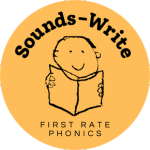Moving Away from Decodable Readers
By Naomi Hinton, Head of Training at Sounds-Write
For students who are just beginning to learn to read, it is imperative that they practise reading books that are consistent with their developing knowledge of the code and how the code works. These are referred to as ‘phonically controlled texts’ or ‘decodable readers’.
When reading these books, students will mostly encounter words containing code that has been previously taught in their phonics lessons, as well as a small number of previously taught common exception words. Reading these books allows beginner readers to practise reading connected text, to build trust in the code and the nature of the code, and to feel successful from the very beginning. Sounds-Write focuses on producing books for the Initial Code and the first half of the Extended Code because it is beginner readers who need the practice provided by phonically controlled books. There are two sets of free ebooks – the First Steps Collection – to get you started.
Our long experience tells us that once students have learned enough of the code, once they understand enough about the way in which the code works and once their skills are near perfect, students will be ready to transition away from decodable readers. This will usually be around halfway through Year 1, although some students’ word attack skills are so good they may graduate to this sooner. Off the back of what they have learned by this time, they can often ‘bootstrap’ themselves, improving their fluency and learning more of the code through practice. Now teachers are able to select text containing a limited amount of code that is yet to be taught. Such texts should incorporate different text types. Informational texts are ideal for students at this stage, as short chunks of texts can be tackled in isolation while, at the same time, introducing students to domain-specific words (Tier 2 vocabulary). Old reading scheme books can be used as, what we at Sounds-Write call, ‘fluency fodder’ for a child at this stage in their reading journey – please don’t throw them away!
Moving away from decodable readers requires teachers to have good knowledge of the scope and sequence of our phonics curriculum – the code knowledge and conceptual knowledge which has or hasn’t been taught? It also requires teachers to have very good knowledge of their students – what they know and what don’t they know? What can they do and what can’t they do? The teacher needs to be able to examine carefully any text they choose and decide if there are any words a student might struggle with when they contain something not yet formally been taught. The teacher then needs to decide whether to pre-teach something, providing the bit of information that will be needed for the student to read the word, or whether to allow the student the opportunity to “figure it out” for themselves, being ready to intervene to teach through errors should they arise. Teachers who are Sounds-Write trained and therefore understand how the written code works can plan to teach through errors using consistent scaffolding: simple gestures and clear, consistent, accurate language.
Most students will be successful in making this transition away from decodable readers – after all, once reading has become proficient, any text is ‘decodable’. Nevertheless, some students will need more practice in applying their code knowledge and skills and in reading more fluently. For these students, teachers can choose from parallel sets of books which contain code which students have already been taught and need to practise.
Sounds-Write has the capacity, through a variety of different texts, to allow students more time to develop fluency using sound-spelling correspondences introduced in the first half of the Extended Code.
You can read more about moving away from decodable readers here, in John’s blog post:
A reply to The Reading Ape: ‘Controlling the text – the dilemma of decodable texts’ (October 26, 2020)
Train With Us
Join the thousands of education professionals using the Sounds-Write programme across the globe.

